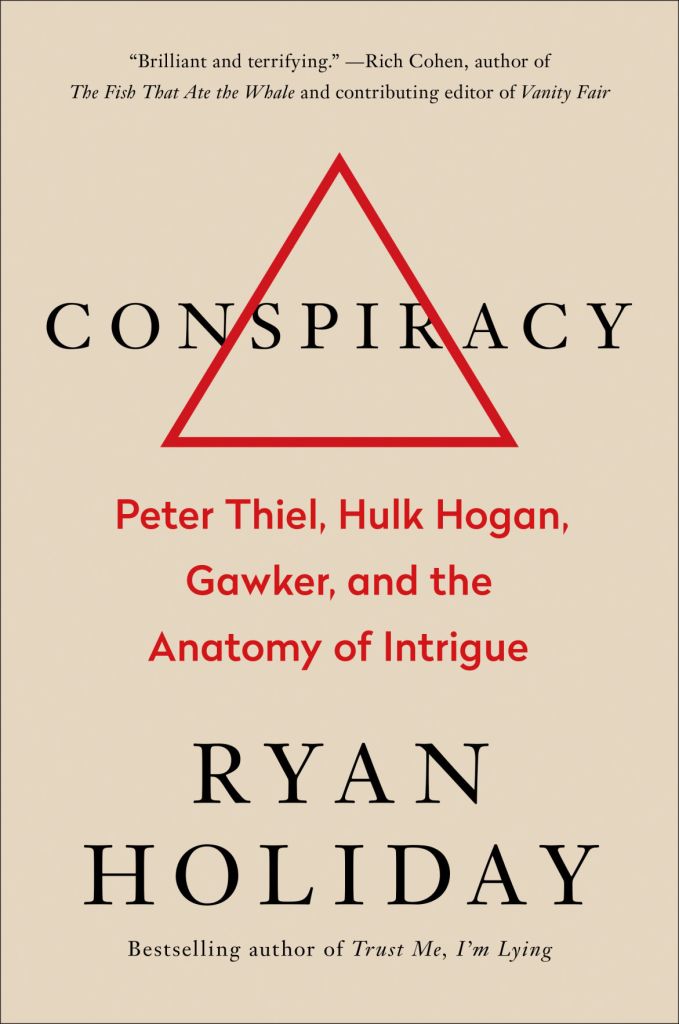Book review: ‘Conspiracy’
Published 12:00 am Sunday, March 11, 2018

- Book review: 'Conspiracy'
“Conspiracy: Peter Thiel, Hulk Hogan, Gawker, and the Anatomy of Intrigue” by Ryan Holiday. Portfolio. 335 pp. $28. Review provided by The Washington Post.
The premise of “Conspiracy” is a delight. It takes real chutzpah, during an investigation into possible collusion in the 2016 election, to argue that we might be better off “if more people took up plotting.”
Trending
Unfortunately for Holiday, his book focuses on a case that demonstrates why transparency beats conspiracy in the long run.
“Conspiracy” chronicles the battle between Terry Bollea, better known as wrestler Hulk Hogan, and Gawker Media, the Manhattan publishing group founded by Nick Denton.
In 2012, A.J. Daulerio, then editor of the company’s flagship site, published excerpts of a sex tape, recorded in 2006 without Bollea’s knowledge, that showed Bollea in bed with Heather Clem, who was then married to Bollea’s best friend: the radio personality Bubba the Love Sponge.
The story may seem wacky already, but this is when it gets truly weird.
In 2007, Gawker Media acquired a powerful enemy when one of its writers outed PayPal founder and venture capitalist Peter Thiel as gay. Gawker’s Denton, who like Thiel is gay and libertarian, believed Thiel’s refusal to be open about his gayness was proof that Thiel was “paranoid.” To Thiel, the story was a terrible violation, one that made him into an object of curiosity, in a way he found incomprehensible.
It took Thiel four years to strike back. In 2011, a Mr. A, whose role is first described in “Conspiracy” but who remains a shadowy figure throughout the book, persuaded Thiel to devote $10 million and five years to a shell company aimed at finding and backing potential lawsuits against Gawker. Among their beneficiaries: Bollea. In 2016, a Florida jury awarded Bollea damages so punishing that Denton had to sell the company. On the surface, it seemed that Thiel’s conspiracy had checkmated Gawker Media.
Trending
Holiday had unusual access to Thiel and Denton. It is one of the many ironies of this story, and of “Conspiracy,” that talking makes Thiel more sympathetic and comprehensible than plotting ever did. But by the end of the book, it’s clear that, despite Holiday’s argument, Thiel’s conspiracy failed: Thiel killed Gawker, but in doing so undermined his dream of making the internet a more decent place and securing a more private life. By contrast, Gawker was destroyed not because its leaders failed to conspire, but because they didn’t pursue the transparency they claimed to believe in.
One of the challenges conspiracies face is that they tend to mistake their most difficult tasks, such as killing Abraham Lincoln or Gawker, for their larger goals (winning the Civil War or cleaning up the internet). Yes, John Wilkes Booth killed the president. And yes, by the end of Bollea v. Gawker, Gawker was dead. But Holiday strangely fails to acknowledge that Lincoln’s death didn’t prevent the Confederacy’s defeat in the Civil War or the Reconstruction that followed, and Booth didn’t live long past the assassination himself. And Holiday can’t quite bring himself to admit that Thiel’s war on Gawker didn’t fundamentally change the nature of the internet.
Thiel’s quest came up short in part because his conspiracy fell prey to a risk that comes from not having to be publicly accountable for your actions: adopting tactics or allies that undercut the broader mission. Thiel and his co-conspirators were willing beneficiaries of an internet-based controversy – Gamergate – that would make the way Gawker outed Thiel look civilized.
Ostensibly a consumer movement opposing unethical video-game journalism, Gamergate was sparked by a highly invasive online rant written by the ex-boyfriend of a video-game designer named Zoe Quinn. Readers falsely suggested that Quinn leveraged a relationship with a Gawker writer for a positive review of one of her games, lending a watchdoggy gloss to an attempt by a man to take revenge on a former partner. Quinn was subject to threats and had to leave her home. The campaign of harassment spread to other people who had either advocated for or embodied diversity in the industry, or spoken up against Gamergate tactics. While Gawker was far from Gamergate’s only target, the movement opened up yet another front in the war on the company’s credibility.
Holiday’s treatment of Gamergate in “Conspiracy” is troublingly brief. This ambiguity and secretiveness should have prompted Holiday to dig much deeper, rather than to accept the conspirators’ stonewalling. It matters a great deal precisely what the relationship between the Thiel conspiracy and Gamergate was.
Even if the conspirators merely watched from the sidelines as Gamergate ripped through the internet, the very existence of Gamergate should have disproved Thiel’s narrow belief that Gawker was the cause of all internet-based nastiness, calling into question whether the target Thiel had chosen was actually the key to his larger goals. But if Thiel’s conspirators had any contact with Gamergate, that would mean they were willing to work with people who made the internet nastier, more stupid, less truthful and more dangerous.
And though his taste for conspiracy may have showed Thiel’s belief that it is important to be able to scheme and act out of the public eye, it also gave the impression that he had lots to hide. When he came forward after the verdict to acknowledge that he had funded Bollea’s lawsuit, it made him seem vindictive and obsessive.
If he had been hiding this plot, what else might he be doing in the shadows? In 2016, journalists jumped on remarks Thiel made about life extension technologies and suggested that he was exploring ways to harvest the blood of the young to promote his own longevity. It wasn’t true, but that didn’t prevent the story from taking off. Thiel’s conspiracy against Gawker Media seemed so implausible that the revelation of its existence made everything else seem possible.
Holiday acknowledges Thiel learned that “unleashing such wild, chaotic forces is a dangerous bargain. And Holiday notes that the case made Thiel a celebrity. But even as he allows for these caveats, Holiday doesn’t reach the honest conclusion: that Thiel’s conspiracy was a failure, not a success. To do so would be to admit that “Conspiracy” doesn’t come close to proving Holiday’s most ambitious argument.
If transparency might have served Thiel better than conspiracy, Gawker’s stated values might have saved the company, too.
Holiday writes that Denton had suspicions that Bollea had a powerful financial backer, but the author quotes former Gawker executive editor John Cook as saying, Denton “did not want to get wrapped in any kind of conspiracy theories.”
Had Gawker been able to chase down proof that Bollea’s lawsuit was the work of an extraordinarily wealthy man stewing over a smaller slight and reported that before the case went to trial, it would have entered the arena on far different terms. As Holiday notes, breaking that story would have bolstered Gawker’s claim to be a serious journalistic outlet.
Thiel himself might have benefitted from choosing transparency over conspiracy. The risk of public scrutiny could have prevented his co-conspirators from allying, however nebulously, with Gamergate, a move that damaged Thiel’s credibility and his stated objective of restoring sanity to the internet. If, instead, Thiel had publicly aligned himself with the many people talking about the dangers of revenge porn and a shrinking private sphere back in 2008 – when the porn aggregation site XTube received complaints that not everyone had consented to the posting of videos available on the site – he could have given their message greater credibility in less-than-receptive circles without incurring collateral damage to the culture of the internet.
By the time Thiel did identify himself as Gawker Media’s nemesis after the verdict in Bollea v. Gawker, the narrative of the trial was well on its way to being set. Thiel discovered that it’s difficult to come forward and insist that you’re the hero of the story when you’ve already won the sort of surprising and dismaying victory that makes the public inclined to believe that you’re the villain.
“Cunning and resources might win the war,” Holiday writes toward the end of “Conspiracy,” “but it’s the stories and myths afterward that will determine who deserved to win it.” The flaw in Thiel’s thinking, and in “Conspiracy,” is in failing to recognize that the stories and the myths that emerge after an event often are the substance of the victory.
– Reviewed by Alyssa Rosenberg, who blogs about pop culture for The Washington Post’s Opinions section.






